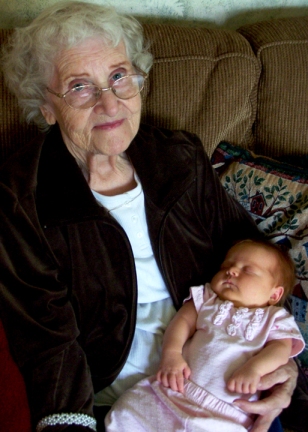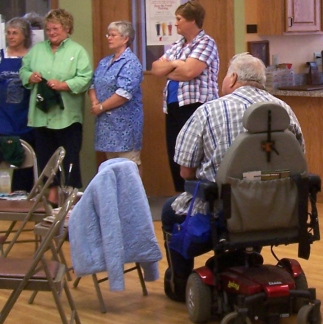Norma Bauer coined the phrase “Temporarily Abled”, or at least introduced me to it. Just as youthful beauty fades, age generally brings a more humbling physical body to all of us if accident or genetic predisposition doesn’t take care of it sooner.
My younger sister Martha, for instance, doesn’t move as much and hurts more than she should. After bouts with ileitis, heart attack, diabetes, kidney stones, cancer, and stroke, her body has signed out of the Temporarily Abled corps and makes her crabby with the things it won’t and can’t do.
It’s not the wrinkles and silver hair I mind (“My face, I don’t mind it, because I’m behind it – It’s the folks in the front get the jar” Anthony Euwer,) except maybe my grandfather’s neck and my grandma’s nose – where did they come from? It’s little things.

What?!? Me on crutches??? (from MillenialMedical.com)
My knees don’t work so well any more. I can still toss grandgirls over my head, but that won’t last another year for the oldest because I’m just not strong enough. My balance isn’t as good, so I’m more conscious of falling and am more often clumsy. Arthritis in my hips, shoulders, and lower back creates days when my overall movement is noticeably limited. Ice cream or high fat sauces give me the runs. I have chronic eczema on my hands and feet. My teeth are bad. Words in the wrong register mush together if I’m not paying attention. The headaches I hoped to grow out of still come and go at whim.
I am lucky. At 67, I could have had to have joints replaced as so many of my friends have, or live with chronic and debilitating pain. I could have the many diseases my sister has encountered. I could be on kidney dialysis or heavy-hitting drugs that attack one thing as they rescue another. I could be dead.
What I’ve noticed as I watch others go through these trials and more is the resilience and indomitability of the human spirit. Beth Ann, despite years of constant pain, knits hats and mittens for kids without any. Cheryl has chronic back problems but has made a priority of marching for peace and other causes she believes in strongly. Bruce takes care of friends’ dogs and drives folks to their appointments when he’s not sitting with his leg up. Nora’s feet limit her walking, so she hosts discussion groups on subjects that interest her and sits with friends who can’t get around even as well as she does. Helen cares brilliantly for two active grandchildren despite crippling arthritis.

Volunteer baby holder!
Part of this is learning to function with the abilities we retain in the lives we’ve built while Temporarily Abled. Part of it is the very lives we’ve built while in that state. Because of Norma and the Americans with Disabilities Act, the house we hope to live in for the rest of our days is designed so we can do just that. Wider doorways, easy transitions from space to space, handles that turn easily, necessities within reach – each one might mean the difference between sitting in my room watching the birds and sitting somewhere I don’t want to be.
But part of it is pure spirit. When the elder you love stands up or bends over and makes that noise, it’s because their mind had forgotten that that is how the body works – or doesn’t work – now. The secret to moving is moving, and concentrating on negatives is not the way these people choose to age.
Depression is an understandable reaction to adversity, especially the kind of long-term adversity invited by the “golden years”. I’m not talking clinical depression, I’m talking the kind of grouchy-making, justifiable sagging of momentum and positive energy that occurs when you just can’t do whatever you’ve always done any more. I invite you to watch those around you, though, and note how many of us human beings choose to find other ways, channel a new path, and focus on what will bring happiness. It’s a trick worth learning early.

Take a class!
My father, at 92, can’t do many of the things he used to do. As I watch him pine for the days of his 70s, when he paddled and built and drove, I look at what he could still do. He has grandchildren and great-grandchildren. He is a carver who does not carve, a naturalist who doesn’t even look out the glass door next to his chair. He still plays piano well, some days, and enjoys practicing when he does it. He doodles and could sketch. He could carve. He could write music, or letters. His inability to focus on the things that could bring him pleasure is his worst enemy.
So I leave you with these thoughts:
- Don’t let your Temporarily Abled status lull you into the false sense of security that you are exempt, or even exempt until some magical age. At best, you’ll be delighted to not need the measures you build into your home and life for eventualities like wheelchairs and bad vision.
- When things happen – and if they don’t to you, they likely will to those around you – approach the situation with an engineer’s mindset. Find a solution. I am now the proud possessor of one of those grabber things I’ve scorned for years, thanks to Martha. It’s great for things like opening the curtain that’s really behind the plant shelf, and not-bending on bad knee days.
- Look at the things you can do. Books on tape, grabbers and walkers can extend your own abilities, and if you can no longer see to embroider you can perhaps knit, or mentor others. Not driving? Check with the Community Action or Senior Center to find a carpool or delivery, or ask the family next door if their teen may chauffeur you for a weekly fee.
- Grow your circle. My father’s hearing contributes to his isolation, but so does his refusal to even try to learn American Sign Language or lip reading. In most of the successful lives I see, community matters. You may find out how many gems lie right around you in a fellowship or club or church or family. It’s amazingly true that we all offer something to the world, even if as Catherine Aird [nearly] said, “If [they] can’t be a good example, [they’ll] have to be a horrible warning.”
- Help someone else. As your circle grows, you’ll find the opportunity to do a kindness here or there, no matter how limited your abilities. Nothing rewards like the feeling of hands-on (or brain- or whatever-on) helping.

Roxy’s window box
- Do something for yourself. If you can’t garden, ask for an Amaryllis for Christmas or treat yourself to one. If you can’t drive, take a taxi to a restaurant and meet a friend for lunch. Write the book. Plant lavender in a window box where the scent reaches your bed. Call a friend from long ago. Listen to music.
Someone once said aging is not for sissies, and I agree. Physical adversity at any time brings change, even temporarily. I invite you to greet it with a wry smile, knowing you’ve prepared for it in advance. May it be so for us all!

My beautiful Mom at 84.
LaVERNE’S SONG by Kathryn W Morski
I used to walk to the store in my everyday dress,
Used to walk with my kids to the park.
I used to run to the window to watch him come home.
How I loved our long walks in the dark!
Used to ski through white meadows, used to dance until dawn
At the hall on the road south of town.
I used to do all these things, felt as though I had wings,
And now, I just walk up and down through the town.
Now, I just walk up and down.
You see, the kids who went walking changed to kids who drove cars
And the kids and the cars moved away.
They write letters. I don’t see them, so I guess I just dream
Of those times at the park, when they’d play.
My Richard died of cancer over five years ago,
Then my hands and my eyes let me down.
I used to live in my own house and mind my own life
And now, I just walk up and down through the town.
Now, I just walk up and down.
The girls at the Home, here, they try to be kind.
We all do the best that we can.
It’s not their fault or mine that I somehow got old.
It’s not their fault they don’t understand.
Another family’s in my house now, like a bloom on a vine,
And I’m glad that they’ve kept it alive.
It seems strange here, with no kitchen, and I can’t plant a thing,
And the trees fight concrete to survive.
I wouldn’t change it. I wouldn’t trade even one day of my life.
I wouldn’t wish all my scars to be gone.
First you crawl, then you walk, then you run through your life,
And I can still walk up and down, up and down.
I can still walk up and down.
I still walk up and down!



I think nearly all people who have some sort of chronic illness or condition also suffer from depression. It would be an interesting statistic to look up. I know when you’ve had a stroke that’s one of the first things that they treat. They assume you will be depressed. They are correct. I am assuming and hoping that it is not a permanent condition, however. I have high hopes of having fun for the rest of my life!
LikeLike
I’m not sure if it’s really depression when you have ample reason to feel sad. Seems to me that’s just a normal reaction to awful stuff happening, and not a chemical imbalance or psychological problem.
LikeLike
What a perfect way to feel – I am, too!
LikeLike
Life, so happy I have the family I have.
LikeLike
My favorite phrase! ‘Old age is not for sissies’! I learned that when I was much younger. After I got my RN I worked in a nursing home for a while and listened to my patients speak of their lives, pain, families and homes (present and past). Everyone’s story was the same but different. I guess that is our shared humanity. Some of the people were content and serene. Some were angry and at times mean. But they had all made it to old age. I also learned that for some being 35 y/o was old. And to some that was still a kid. Perception is the qualifier.
LikeLike
Mom was much more cheerful than Dad is. She loved being with family and it kept her attached even though she didn’t know which of her cousins I was!
LikeLike